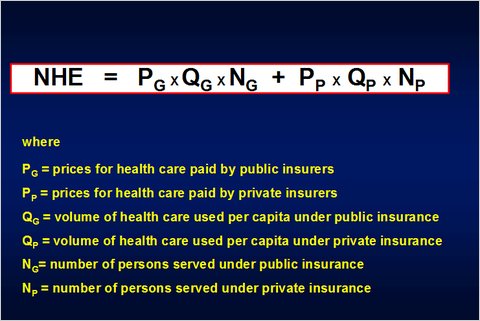The Bureaucratic Mind
The bureaucratic mind is always inside the box. The entrepreneurial mind is always outside the box. Once inside the box, it’s virtually impossible to see how any problem can be solved without victims bearing severe costs. Exhibit A comes from Uwe Reinhardt, writing today in The New York Times. Consider this formula:
Uwe then opines:
- Providers will resist price decreases (the P variable).
- Patients will not voluntarily consume less care (the Q variable).
- And everyone wants to be insured (the N variable).
Thus, absent some miracle — for example, that bundled payments per episode of illness to so-called Accountable Health Organizations will actually serve to bend down the future time path of health spending noticeably — the nation is likely to rely in the years ahead on rationing more and more of health care by income class.
QED.
Unless you are an entrepreneur and you want to get rich by seeing things differently. Then you find a way to write a new formula. This is exactly what scores of innovators are doing in every health market where the third party payers aren’t.



At least one faulty assumption on Professor Reinhardt’s part: obviously everyone does not want to be insured, at least at the prices charged. It is a bad deal if you have no assets and can rely on the safety net coverage if you need it.
“Free” care is obviously another kettle of fish.
And (private) third party payers do innovate, the newer HSA qualified policies being a case in point.
The extent to which people want to be insured is caused by the (incorrect) assumption that health benefits (and health care once insured) are free. If people realized how much they actually pay for their employer-sponsored health plan, they would demand less comprehensive benefits, which is what happens in the individual market.
Once insured, demand for care is infinite when the perception is that the good or service is nearly free.
Nice post. And your right. Very few people want to think outside the box.
Good post. And you are right on. The bureaucrats are trapped in thier own boxes.
Does this in-the-box thinking apply to other types of insurance as well, or just health insurance?
I like the idea of Americans having the power to rewrite the equation. The current one isn’t working.
I’ve seen Uwe’s presentation before. This is a good response to it.
Cosmetic surgery and Lasik are not really medicine. The rest, except for imaging, are negligible.
Steve
Steve, you are missing the point. When third parties are not involved, medicine functions like a real market. In the international medical tourism market, everything that is elective is offered, priced and packaged the way services are in the market for other professionsal services.
I’ts always interesting to be reminded that we were in a health spending “crisis” in the late 1970s, when health spending/GDP was half what it is now.
How did we dodge the bullet of “collapse”? Outside health care (and education, of course), free markets and (therefore) innovation fourished, so our incomes (the denominator of the ratio) grew quickly, so we have more real dollars now than we did then – even after subtracting health spending (see http://tinyurl.com/4h23wd5.)